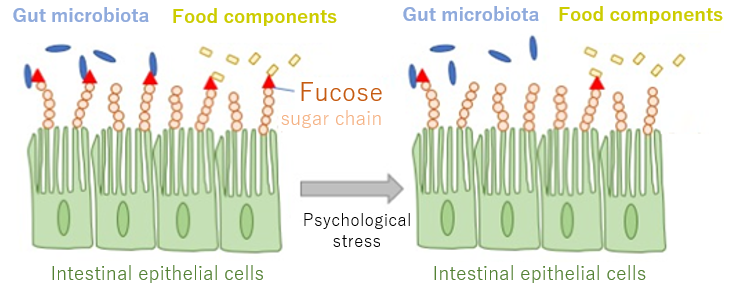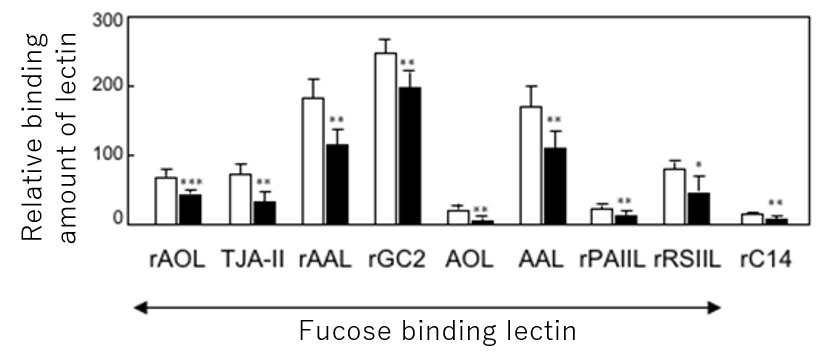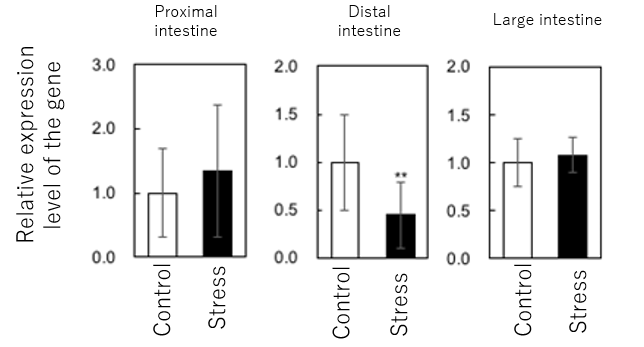The National Agriculture and Food Research Organization (NARO), in collaboration with the National Institute of Advanced Industrial Science and Technology (AIST), Ibaraki University and The University of Tokyo has revealed for the first time that mice subjected to psychological stress exhibited the reduction of a specific sugar chain (fucosylated sugar chain) in intestinal epithelial cells that cover the inner wall of the small intestine. The result of this study is expected to be useful to elucidate the mechanism of changes of gut microbiota in response to psychological stress.
Overview
Psychological stress is known to adversely affect the functions of the gastrointestinal tract and fluctuation of the gut microbiota composition. Conversely, uncomfortable gastrointestinal symptoms such as abdominal pain and stimulation of metabolites produced by microbiota are transmitted to the brain, which further worsen the symptoms of stress (microbiota-gut-brain interaction).
In this study, we focused on sugar chains of intestinal epithelial cells as an indicator of psychological stress. Intestinal epithelial cells express various sugar chains on the surface. This sugar chain provides sites where intestinal bacteria and food components adhere to the intestinal epithelial cells (Fig 2.). We performed lectin microarray analysis to analyze sugar chain profiles comprehensively in mouse intestinal epithelial cells. Exposure to chronic social defeat stress (CSDS), a murine model of psychological stress, resulted in reduction of fucosylated sugar chains which contain fucose as terminal residues.
As the changes in fucosylation of epithelial cells are associated with alternation of microbiota, the results of this study will be useful to elucidate the mechanisms of microbiota-gut-brain interaction.
Publication
Omata Y, Aoki R, Aoki-Yoshida A, Hiemori K, Toyoda A, Tateno H, Suzuki C & Takayama Y (2018) Reduced fucosylation in the distal intestinal epithelium of mice subjected to chronic social defeat stress. Scientific Reports 8, 13199 DOI: 10.1038/s41598-018-31403-8
For inquiries
Contact: http://www.naro.go.jp/english/inquiry/index.html
Reference Information

Figure 1 Microbiota-gut-brain interaction
Psychological stress in brain is transmitted to the intestine via the central nervous system and the endocrine system, which causes uncomfortable gastrointestinal symptoms such as abdominal pain, diarrhea and fullness. In the contrary, intestinal sensory stimulation is transmitted to the brain, which further worsen the symptoms of stress. In addition, psychological stress causes changes in gut microbiota. Gut microbiota directly or indirectly influence brain function. This functional relationship is called "microbiota-gut-brain interaction".

Figure 2 Reduction of fucose-containing sugar chain (fucosylated sugar chain)
by psychological stress
Intestinal epithelial cells express sugar chains on the surface. This sugar chain plays a significant role for intestinal epithelial cells to interact with gut microbiota and food components. Transduction of psychological stress from brain to gut via the sympathetic nervous system or the endocrine system causes the reduction of the fucosylated sugar chains that contains fucose as the terminal residues. This reduction may affect the interaction between intestinal epithelial cells and gut microbiota or food components.

Figure 3: Decrease in lectin reactivity to fucosylated sugar chain of
intestinal epithelium due to psychological stress
The reactivity of 96 kinds of lectins with distal intestinal mucosa obtained from stress mice (■) were compared with that of non-stress (□) mice using a lectin microarray. The reactivities of nine kinds of lectins are significantly decreased by psychological stress. Those lectins, except rC14 were fucose-binding lectin (α1,2-fucose binding lectin). This reduction was not observed in the proximal small intestine or large intestine. Error bars shows the standard deviations. Statistical significance was expressed as *** 0.1%, ** 1%, * 5%. This result shows that fucosylated sugar chains of intestinal epithelial cells are reduced by psychological stress.

Figure 4: Effect of psychological stress on Fucosyltransferase 2 gene expression
Relative gene expression level of Fucosyltransferase 2 in intestinal epithelium from stress(■) and non-stress(□) mice. In response to psychological stress, the level of Fucosyltransferase 2 gene expression decreased in the distal intestine. Error bars shows the standard deviation, ** indicates statistical significance at 1% level.




